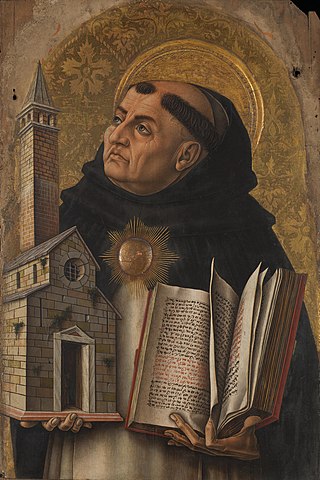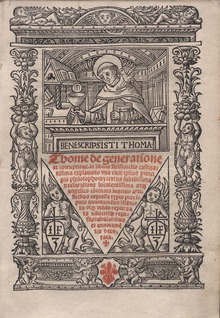Related Research Articles

The Summa contra Gentiles is one of the best-known treatises by Thomas Aquinas, written as four books between 1259 and 1265.

Thomism is the philosophical and theological school which arose as a legacy of the work and thought of Thomas Aquinas (1225–1274), the Dominican philosopher, theologian, and Doctor of the Church.

The Peripatetic axiom is: "Nothing is in the intellect that was not first in the senses". It is found in Thomas Aquinas's De veritate, q. 2 a. 3 arg. 19.

The Summa Theologiae or Summa Theologica, often referred to simply as the Summa, is the best-known work of Thomas Aquinas (1225–1274), a scholastic theologian and Doctor of the Church. It is a compendium of all of the main theological teachings of the Catholic Church, intended to be an instructional guide for theology students, including seminarians and the literate laity. Presenting the reasoning for almost all points of Christian theology in the West, topics of the Summa follow the following cycle: God; Creation, Man; Man's purpose; Christ; the Sacraments; and back to God.
Summa and its diminutive summula was a medieval didactics literary genre written in Latin, born during the 12th century, and popularized in 13th century Europe. In its simplest sense, they might be considered texts that 'sum up' knowledge in a field, such as the compendiums of theology, philosophy and canon law. Their function during the Middle Ages was largely as manuals or handbooks of necessary knowledge used by individuals who would not advance their studies any further.
Eliben Joseph Chabillo was a Spanish philosopher who lived in Monzón, Aragon, in the second half of the fifteenth century.
Anthony of Sienna was a Portuguese Dominican theologian, so called because of his great veneration for Saint Catherine of Siena. He was born near Braga in Portugal. He studied at Lisbon, Coimbra, and Louvain, eventually coming to teach philosophy at Louvain. There he was made Doctor of Theology in 1571, and in 1574 was put in charge of the Dominican college there.

Reginald of Piperno was an Italian Dominican, theologian and companion of Thomas Aquinas.
Hervaeus Natalis was a Dominican theologian, the 14th Master of the Dominicans, and the author of a number of works on philosophy and theology. His many writings include the Summa Totius Logicae, an opusculum once attributed to Thomas Aquinas.
The argument from degrees, also known as the degrees of perfection argument or the henological argument is an argument for the existence of God first proposed by mediaeval Roman Catholic theologian Thomas Aquinas as one of the five ways to philosophically argue in favour of God's existence in his Summa Theologica. It is based on ontological and theological notions of perfection. Contemporary Thomist scholars are often in disagreement on the metaphysical justification for this proof. According to Edward Feser, the metaphysics involved in the argument has more to do with Aristotle than Plato; hence, while the argument presupposes realism about universals and abstract objects, it would be more accurate to say Aquinas is thinking of Aristotelian realism and not Platonic realism per se.
In rhetorical theory, the quaestiones are the points being debated.
Prochoros Kydones, Latinized as Prochorus Cydones or Prochorus Cydonius was an Eastern Orthodox monk, theologian, and linguist. An advocate of Western Aristotelian thought, his translation of Latin Scholastic writings, brought him into conflict with Hesychasm, the leading school of Byzantine mystical theology, and its most vigorous defender, Gregory Palamas.

The Thomas-Institut is a research Institute whose function is to study of medieval philosophy by preparing critical editions as well as historical and systematic studies of medieval authors.
Thomas of Sutton was an English Dominican theologian, an early Thomist.
Petrus de Ibernia, also known as Peter of Ireland, was a 13th-century writer and lecturer who is believed to have taught logic and natural philosophy to Thomas Aquinas.
Serafino Porrecta was an Italian Dominican theologian.

Thomas Aquinas was an Italian Dominican friar and priest, an influential philosopher and theologian, and a jurist in the tradition of scholasticism from the county of Aquino in the Kingdom of Sicily.
Actus essendi is a Latin expression coined by Saint Thomas Aquinas (1225–1274). Translated as "act of being", the actus essendi is a fundamental metaphysical principle discovered by Aquinas when he was systematizing the Christian Neoplatonic interpretation of Aristotle. The metaphysical principle of actus essendi relates to the revelation of God as He Who is, and to how we as humans perceive God’s essence. Aquinas elaborates on the fact that God’s essence is not perceived as sense data; rather, the essence of God can only be understood partially in terms of the limited participations in God’s actus essendi, that is, in terms of what is real, in terms of God’s effects in the real world.
The Editio Leonina or Leonine Edition is the edition of the works of Saint Thomas Aquinas originally sponsored by Pope Leo XIII in 1879.
The Quaestiones Disputatae de Veritate by Thomas Aquinas is a collection of questions that are discussed in the disputation style of medieval scholasticism. It covers a wide variety of topics, from the definition of truth to divine providence, conscience, and the good and free decision.
References
- I. T. Eschmann, O.P., 1956 catalog of Thomas's works

